What to Watch When You’re Not Obsessing (or Obsessing too Much) Over the Election
A mid-week potpourri of movies and TV from BordoLines
I’ve been pretty obsessed with politics lately, so those of you who’ve subscribed recently may not be aware of my other obsessions: movies and television.
If you pull down the “TV Watch” category on the BordoLines homepage, you find stacks on series whose every episode I followed from week to week—“Succession,” “Perry Mason,” “The Diplomat,” “Happy Valley,” “True Detective”, “Ripley”, “The Bear”, “The Morning Show,” and others. And if you pull down “At The Movies,” you’ll find full stacks on some of the “big” movies from 2023-4 that all of you have heard of (and very likely seen: “Oppenheimer,” “Barbie,” “Maestro,” “Anatomy of a Fall,” “Everything, Everywhere, All at Once”, “Poor Things,” and other Oscar-nominated films.
But there are lots of great movies and television shows that I’ve mentioned in passing, or as part of a stack dealing with multiple shows. In this stack, I’ve curated some favorites to serve as recommendations if you’re looking for something to calm your nerves, jangle your nerves, make you weep, provide some joy, or just distract you. (All are streaming somewhere, by the way.)
I’ll start with some current and relatively recent movies and series:
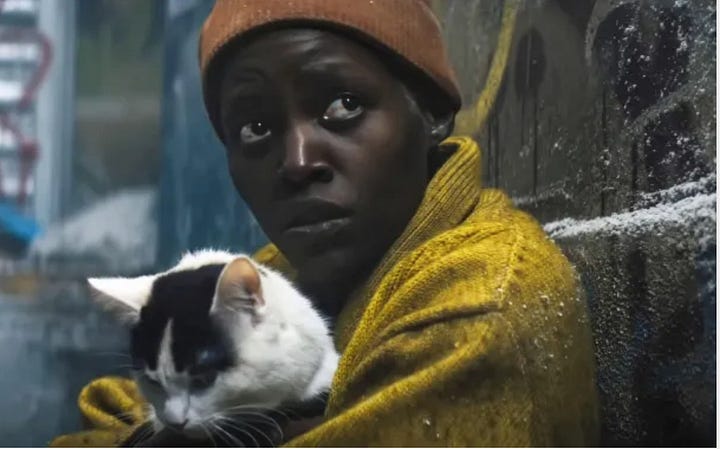
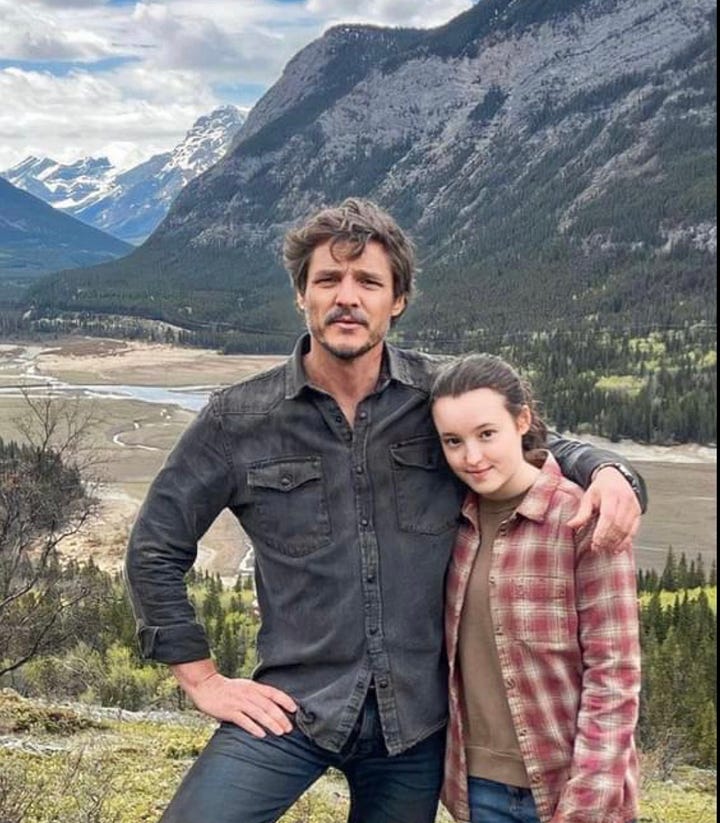
A Quiet Place: Day One (Which Owes a Lot to “The Last of Us”)
Variety’s Peter Debruge criticized the fact that most of “A Quiet Place: Day One” was "tiptoeing through a mostly off-screen apocalypse.”
That’s a good thing. I’m tired of the monsters taking center-stage, and “The Last of Us” showed me that others felt the same way. Yeah, in that series (and when is it coming back, please?) there were zombies running around, sticking their grotesquely long and fungus-y tongues in people’s mouths. But the show was really about the evolution of a love (love, not sex) relationship between a traumatized, emotionally walled off man (Pedro Pascal) and a 14 year-old post-apocalypse generation girl (Bella Ramsey.) Ellie’s bravery and survival skills are handy in dealing with the deadly obstacles they meet during their trek across the States, heading for the outpost where Bella’s immunity to infection may (or may not) provide the key to a vaccine. But she is as affectionate, tolerant, and craving connection as she is tough, and for many episodes she babbles away good-naturedly, seemingly immune to Joel’s taciturn, irritated responses. He’d lost his daughter in the first wave of marauding zombies, and he’s not about to open his heart easily to Ellie But it turns out Ellie is just the kind of personality to break through, and when, after she escapes from a crazed pseudoChristian cannibal, Joe catches her and embraces her—“It's okay, baby girl.I got you.I got you”-even the scriptwriters were bawling.
“Day One,” like “The Last of Us” is an apocalypse movie with a heart about broken people who find each other in horrendous circumstances. Right now, it’ll cost you $19.95 to rent. It’s worth it. And you don’t even need to have seen the two movies about the aftermath. It’s not about the monsters. It’s about the delicate development of a relationship between the terminally ill Sam (Lipita Nyong’o, so beautiful), Eric (Joseph Quinn), a British law student far away from home, and Frodo, a service cat who has apparently learned not to meow. (The monsters respond to sound.) At first Eric seems to have been made almost catatonic from fear while Sam’s resignation to her impending death has rendered her cynical and depressed. All she wants to do is cuddle her cat and get back to Harlem for a piece of pizza. (If that last wish seems absurd, hang on. You’ll discover its deeper emotional meaning.) But the three—I’m including Frodo—connect in an intuitive way that feeds all their souls. And the end—which could have been done in a stale and maudlin way—is an eloquent, non-tortured, perfect gem.
Under the Bridge
The events/book on which it’s based (but fictionalizes in significant ways) really happened, and the backstory is fascinating: The author of the book—the brilliant Rebecca Godfrey, who died at age 54–was made into a character in the series (approved by her; she worked on the screenplay and casting up until her death.) It has a stunning cast of both well-known and not, and I’m surprised that it hasn’t gotten much attention. Riley Keoghan perfect for the role of Rebecca. Actors who play the teens all wonderful. Loved it for the scary, textured, and surprisingly tender portrait of (all but one, who is a true psychopath) the queen bees, wannabes, zoned out boy who fall into murder. Excellent job of adding fictional elements to capture the essence of the book. Last episode was a disappointment; my theory is that Godfrey (who worked on screenplay) died before it was written.
And a word about Lily Gladstone: I LOVE her gorgeous face, I love her stocky body, I love her deep voice. I love her tummy roll in her cop uniform. I love her in that sweater at the bar. She is so totally unlike any other actresses around—who frankly, despite their differences, have begun to bore me with their obedience to “feminine” norms. Gladstone is a disrupter of perceptions and expectations. And oh, God, do I love it when someone does that!
A Thousand and One
Don’t pay any attention to the white guy on the “Roger Elbert” review site who gave “A Thousand and One” (written and directed by A.V. Rockwell) just three stars and complained about the ending. I’m pretty sure Ebert himself would have give it more of himself. You have to watch this film—one of the best I’ve seen in years—with no conventional expectations. Savor the faces, let your heart break with the story, hear how much is communicated between people (and hid from each other) in silence and then words you wait for, sometimes get, sometimes don’t, and sometimes take your breath away. The beauty of the characters is overwhelming. The scenes between mother (Inez de la Paz) and her young son (Aaron Kingsley Adetola; Aven Courtney) their heads nestled, are almost unbearable in their sweetness. People don’t change according to movie-time pace, driven by plot. They move slowly and laboriously through life, and every victory is earned. The ending, which the Elbert reviewer saw as an arbitrary and unecessary “twist” is nothing like that. It’s the culmination of everything the movie is about.
Are You There God? It’s Me, Margaret
Believe it or not, I had never heard of “Are You there God? It’s Me Margaret” until recently. In 1970, when the book was published—with a recommended age level of 9-12–I was 23 years old and my life was more like that of author Judy Blume’s herself, stuck in a first marriage that wasn’t working out. When I was Margaret’s age in the book—for me, that would be the very end of the fifties—we were a little more experimental and a lot less wholesome than Margaret and her friends. And there was no Judy Blume to read. In fact, there was no such thing as “young adult” fiction.
After I saw the movie of “Are You There, God?” (Adapted and directed by Kelly Friedman Craig) I read the book for the first time, and to be honest, liked the movie a lot more. The book was ground-breaking for decades but now seems stale (sorry, I know that will horrify Blume fans who see it as a “sacred text”.) Written from Margaret’s point of view as a child living her life—not looking back—in the 1970’s, it logically doesn’t have much in the way of period detail. Blume didn’t paint a picture of what the girls were wearing (other than no socks under loafers), what the furniture in their living room looked like, or what kind of dances they did in the basement. The movie does that, And paradoxically, putting Margaret’s (Abby Ryder Fortson) life more squarely in its time and place is what refreshes it. Contemporary girls of Margaret’s age can laugh at the relics of “sanitary pads” and training bras while being reassured that secret anxieties—theirs even more tormenting than Margaret’s, because they aren’t supposed to have them—have always been a feature of growing up female. And those of us who did live through a less knowing time can have the pleasure of more precise recognition.
Bridgerton Season 3
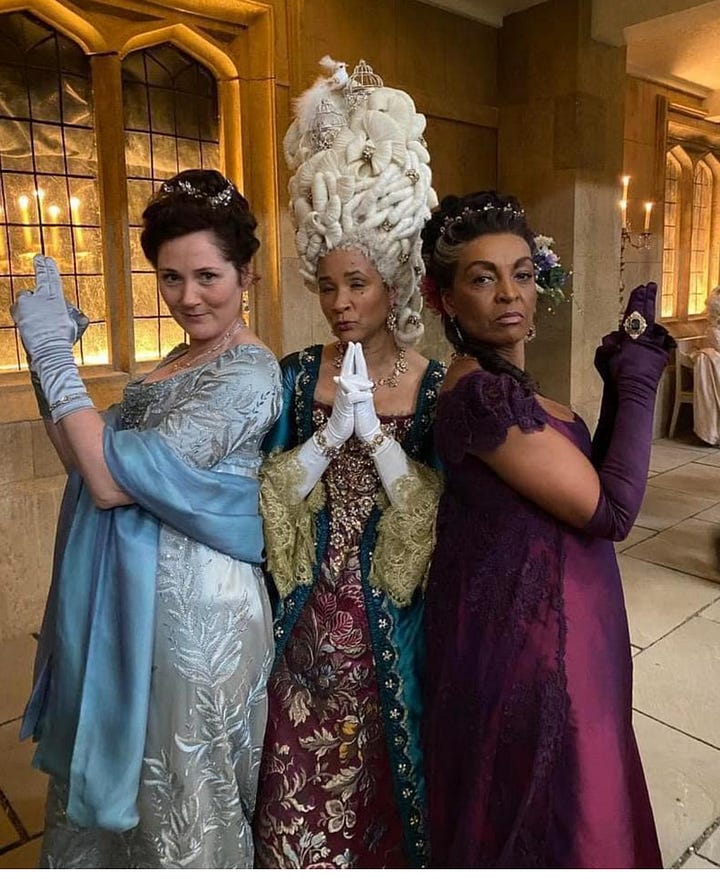
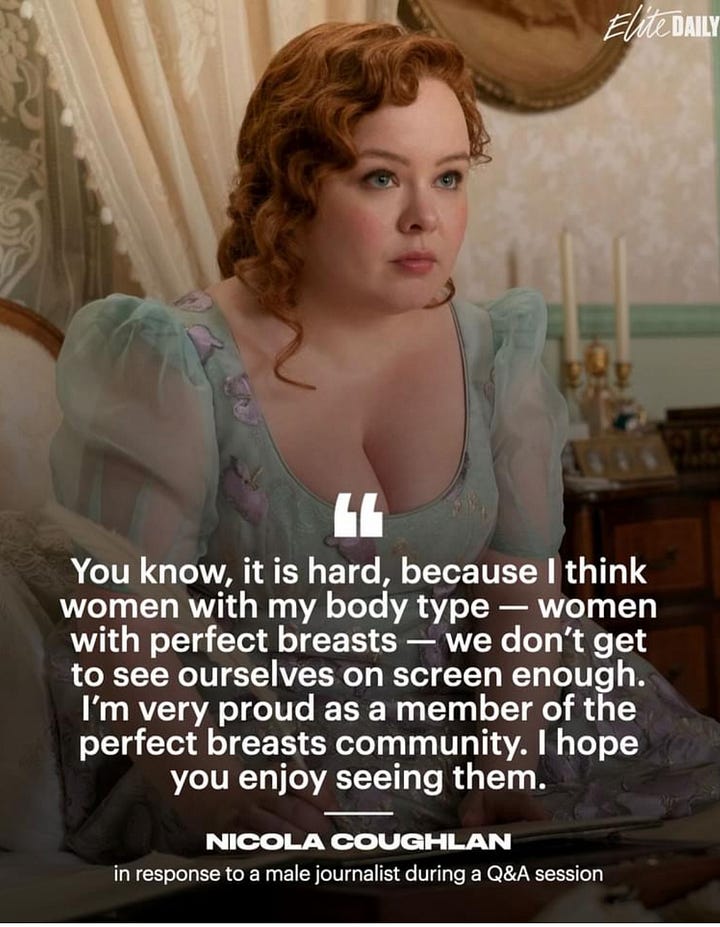
Shonda Rhimes is an expert at combining the progressive (in “Grey’s Anatomy,” diverse cast, strong women) and the conventional (plots centered on love affairs or/and disasters) in just the right proportions to win a huge following while inserting subtly subversive elements. The popular “Bridgerton” series broke ground by racially mixing—romantically and class-wise—the matings and hierarchies of a genre (the historical romance) that until then had been Jane Austen white.
Bridgerton season 3 may not be the best of the series (My personal favorite is actual the prequel, “Queen Charlotte,” which I wrote a separate stack about1 But it has great male eye candy (though none can top the first season for that) and the pudgy, short Penelope, accompanied by a huge PR blitz, finally gets to have steamy sex and true love. That’s Shonda Rhimes for you, can always be counted on to break body norms. It’s the one show Cassie and I watch together. I asked her why it’s so popular across generations. “Because it’s basically a teen romcom, but dressed up as history for the adults.” I thought that nailed it.
We’ve roped my husband in too. And he doesn’t even care about the male eye candy.
The Gilded Age
Did I ever need this series! For just an hour, no nausea-inducing political polls. No underground tunnels. No women fleeing Texas for abortion. For just an hour.
Instead: Dresses that either ruined ones posture or preserved it (hard to tell.) Great dangling bling. Men with full beards but no “MAGA” hats. Delicious looking little cakes and no glucose monitors. A world in which Dukes are “poached.” In which virtuous, long-suffering Aunt Ada (Cynthia Nixon) is rewarded with an unexpected inheritance and her haughty sister Agnes (Christine Baranski, perfect as always) brought down a peg. A world in which—the Gods of smart, unabashedly ambitious women be praised!—every seat in Bertha Russell’s Met is filled.
The Gilded Age is pure, soap-opera deliciousness, with cattiness, social-climbing, and high ceilings galore. I looked forward to it every week, and can’t wait for it to return, if only for Carrie Coon as Bertha Russell, a crafty, imperious member of “new” New York. She isn’t just trying to wend her way into the old social order, with its reigning queen, Mary Astor. She intends to conquer it, and her voice drips with her scheming aspirations. She has perfect, snobby enunciation but also a kind of contained sexiness that shows her deep, animal nature. It’s very distinctive—all the other societal ladies simply sound like society ladies. But Coon is a leopard, always holding her pounce back in the interests of decorum, but never letting you forget it’s there, in waiting.
Brats/Fast Times at Ridgemont High
I’m not a big fan of Andrew McCarthy’s kvetchy documentary about being famous for a minute and then forgotten, but my review2 of the movie “Brats” did provide me with a reason to watch yet again one of my favorite films of that era.
John Hughes wasn’t the first to venture inside the awesome grodiness (sp?) of the 1980’s high-school. Amy Heckerling, a first-time director who later went on to make “Clueless” (imo, the best screen adaptation of Jane Austen’s “Emma”) was less self-consciously focused than Hughes was on major teen “issues” (e.g. with parents and teachers, cliques, labeling and bullying) than on the everyday culture of teen life, and she deliberately chose a cast that still had baby-faces and had them behaving cluelessly in virtually every situation. The movie is funnier, sweeter, and, especially if you’re a teenage girl, more “like real life” than any of the Hughes movies. Everyone (not just those from the “wrong side of the tracks”) works after school. At the mall. Stacey (Jennifer Jason-Leigh, so adorable) decides to lose her virginity pretty much the way I did—time to get it done with. She tries with a nice boy who runs scared, leaving her baffled. (Don’t all guys want to do it? What’s wrong with me?) Sex with the more “experienced” guy is split-seconds long and then he runs away too. It’s all so recognizably, miserably awkward. (The studio heads, disappointed, called the movie “sexual but not sexy”—which of course is what teen sex often is. Or at least, used to be before teenagers learned how to do it from the internet.) But one-time crappy sex is enough to get Stacey pregnant. She has an abortion—and yet (gasp!) manages to go on with her life.
And (unlike the Hughes movies) there’s even a few Black teenagers at their high school (Forest Whitaker’s first role)!
May December
Gracie (Julianne Moore) is a tightly controlled woman who—although she denies it to herself and others—is haunted by the damage she did and the insecurities she is now confronting decades after she was flayed by the headlines and ultimately served a prison sentence for her affair with a seventh-grade boy, Joe (Charles Melton.) After release from prison, she marries Joe and raises a family with him in Savannah, Georgia. The story opens with two disruptive happenings: The twins she’s raised with Joe are about to graduate from high school and leave the “nest,” forcing both Gracie and Joe to imagine life together alone. And a soap-opera actress, Elizabeth (Natalie Portman) arrives to do research for a film she’s cast in as Gracie.
Todd Haynes has never been a preachy movie-maker. He’s less interested in declaring a fixed identity—e.g. Gracie as predator—that he is in the social barriers that place people—especially women— in what he describes in an interview with Elvis Mitchell as the “prescribed domestic worlds” that they find themselves in, struggle against, and sometimes in that struggle “encounter themselves in the margins without even realizing or meaning to be there.”
It’s certainly the case with “May December.” 3In a rare moment of mutual candor and understanding, Elizabeth tells Gracie, after having coffee with Gracie’s first husband that she can “see how being in a relationship with him, in a marriage, would be isolating.” “Precisely,” Gracie replies, and for a moment they’re like girlfriends. The “prescribed domestic worlds” are the source of struggle in “Mildred Pierce,” “Carol,” and “Far From Heaven,”too. Women (and in the case of “Far From Heaven” men) trying to be what it isn’t in their nature to be.
If one had to identify a villain in any of these films, it’s the “respectable” world—the world of “the center”—that is the most despicable predator: growling under its breath, showing its fangs, ready to pounce, to tear apart, to chase out of town. The world that sends a box of shit to Gracie and Joe. The world that leads Mildred Pierce, in her desperate craving for “respectability,” to raise her daughter Veda to be a monster. The world that tape-records Carol and Therese’s beautiful night together in order to provide ammunition that Carol’s husband could use to take her child away from her. The world that throws Cathy and Frank Whitaker into a marriage of heterosexual normativity and personal misery, and shuns Cathy for becoming “more than friends” (even “just friends” is unacceptable) with Raymond, a Black man.
I’m also watching now:
1) The Serpent Queen, season two. History is “all higgledy-piggledy” in the show (Alice Burton, in Vulture) and Rahima (Sennia Nanua) who I loved, is barely there. But Minnie Driver is so entertaining as Elizabeth I “as you’ve never seen her before” and I live for Samantha Morton’s dry, bitchy asides to us. It’s not as good as season one—which I thought was great—and it’s clear historical drama has given up all aspirations to factual accuracy. I don’t care, because it’s not pretending the way Philippa Gregory did.
2) Lady in the Lake: I can’t say I look forward to it, but I’m sticking with it until what promises to be a bitter end this week. It’s too noir for Edward; I had to change to the Olympics for him. But there’s a really great “I’ve had it with this pig” dish breaking, suitcase-packing scene after her husband throws the brisket out because Natalie, distracted by the missing Tessie Durst, puts it on a dish meant for dairy. Moses Ingram, who plays the doomed Cleopatra, is hypnotic. Except who ever heard of lamb brisket? (Go ahead, shame me with superior brisket knowledge, I’m ready for it.) And why does Natalie Portman lose her “Jewish” inflection and tone after the first episode?
Older Romantic Movies With Actors You Want to Look At Forever:
The French Lieutenant’s Woman
Meryl Streep and Jeremy Irons at the height (1981, director Karel Reisz) of their glamour, playing dual affairs, one between Charles, a conventional Victorian gentleman whose life comes apart when he falls in love with Sarah, a mysterious woman “with a past”; the other a cooler extramarital relationship between the two actors playing the roles of Charles and Sarah in a modern filming of the story. My idol Pauline Kael wasn’t thrilled with Streep, who she criticized (as she often did) as technically brilliant but lacking both the mystery and the sensuality of the Sarah of the John Fowles novel. Maybe. But she was so gorgeous to look at. And as I realized when making this list, I’m a sucker for movies about tortured love—especially if it’s the men that are tortured. I’m not a feminist sadist, it’s just such a delicious fantasy to have them be the ones who pine away and can’t eat for longing.
Atonement
More tortured love, this 2007 one, directed by Joe Wright, based on the novel by Ian McEwan, and starring James McAvoy (not usually one of my favorites, but very working-class appealing here), Keira Knightly, and Saoirse Ronan when she was still a child actor. The premise is existential: how one thoughtless action—a child’s (Ronan) misinterpretation of a breathless, against-the-wall sexual coming-together between the housekeeper’s son Robbie (McAvoy) and the elegant Cecilia (Knightly)—spills out disastrous consequences for all their lives. The time of the action is the Second World War. The ending, which I won’t disclose for those who haven’t seen it, is both beautiful and heart-breaking.
The Age of Innocence
After Mean Streets, Taxi Driver, Raging Bull, and Goodfellas (all of which I’ve seen many times) I wasn’t expecting a lush, historical drama in 1993 from Martin Scorsese. But it turns out he’s as much a master of the sumptuous as the gritty. The wry class-commentary (I’m sure a big reason why the novel appealed to Scorsese) comes straight from Edith Wharton. But the director, the cinematographer, the costumer, the set-designer, and stars (Daniel Day-Lewis, Michelle Pfeiffer, Winona Ryder, with a perfect narration by Joanne Woodward) make it so gorgeous it’s almost edible. And without a single naked scene, so sexy. The tentative stroking of a gloved hand in a carriage. The magnetic pull of outlawed desire, bringing them closer…and closer…and closer. His mouth is on her neck, then her shoe (her shoe!) He kisses her, and she looks like she won’t be able to resist. But now, in torment, she’s breaking away from him, reminded of his engagement and the society that will condemn them if they go further. Good grief, pass me my fan.
Two Entertaining Movies You May Have Avoided Because of the Personal Lives of the Directors:
Midnight in Paris
I don’t care what you think of Woody Allen’s life-choices. Or if you find it irritating that he always casts himself or nebbishy stand-ins for himself with spectacularly attractive women. This—Allen’s 41st film—is a movie my husband (who isn’t a fan of any other of Woody’s movies) and I see over and over. He loves the way the film captures the magic of Paris. But for me, the film is enduringly entertaining because of the amazingly perfect (and often hilarious) writing and casting of the historical characters that the hero Gil Pender (Owen Wilson) meets on his midnight excursions back in time. Hemingway (Corey Stoll) Gertrude Stein (Kathy Bates) Scott Fitzgerald (Tom Hiddleston) Salvador Dali (Adrien Brody). And others. They are all look and act exactly the way you’ve imagined them—perhaps because it’s largely through caricatures, famous photographs, and quasi-fictional mythology that we “know” them. But descriptions won’t do; let me show a scene that I can’t watch without cracking up:
Rosemary’s Baby (1968)
Pulanski’s genius—which many others have emulated since—was to “evoke menace and sheer terror in familiar routines” and settings. No haunted houses, no grotesque monsters. The coven of witches who engineer the Satanic rape and oversee Rosemary’s pregnancy—“it’s just some fresh herbs and vitamins, dontcha know”—seem just like any pestering old couple who live down the hall. Rosemary and her ambitious husband Guy (who has struck a deal with the devil) hang wall-paper, make fondu, browse NYC bookstores, and have parties just like any ordinary over-privileged yuppie couple. Rosemary has nice girlfriends who cluck over her when she’s getting too thin and pale (even for Mia Farrow in her most waif-like role.) And Charles Grodin (as the young, modern-minded obstetrician whose aid she seeks when she realizes what’s going on) looks like such a nice, pleasant guy that viewers are as shocked as Rosemary when he (unwittingly) hands her over to the coven. Nothing portends evil as in the typical horror movie. The music is a “lalala” lullaby (sung in the soundtrack by Farrow) that only sounds creepy because we know she’s not going to be rocking a darling Gerber baby. Those “health” shakes Minnie Castevet (Ruth Gordon, whose jangling jewelry enters every room before her) are not really “packed with vitamins” and that baby has the strangest eyes….
Two Great Thrillers That Still Will Jolt You
In the Cut
If you’re not a Jane Campion fan, you probably won’t like this 2003 movie. But I am a fan, and I couldn’t disagree more with the “consensus” of Rotten Tomatoes that in the film, Campion “gets tangled in her own abstraction.” The last thing I’d call In the Cut is abstract. Plastically enhanced “perfect” movie-bodies are visual abstract(ions) from actual flesh. Smooth desire without danger or vulnerability is a movie-abstraction from actual sexuality. Franny Avery (Meg Ryan, in the darkest, most non-cutesy, and probably the only truly erotic role of her career) is tense, alive, obsessed, watchful and watching. And the underbelly world of the movie is seen entirely through her experience, including her unwholesome, steaming seduction by Mark Ruffalo, a detective who exudes both dangerous and protective maleness. In the Cut makes you realize that the conventions of most thrillers are handed down from one male director to another, and it cuts right through them. But be forewarned: The defiance of those conventions involves some disturbing images.
Don’t Look Now
Nicholas Roeg’s 1973 horror-film has two unforgettable images. No one who has watched the film can ever see a small person in a red raincoat running across an alley in same way again. The other is not so much an image as a sequence, in which Roeg intercuts images of Laurie and John (Julie Christie and Donald Sutherland) getting dressed for dinner with loving but raw shots of the sex that preceded their relaxed, intimate preparations for going out. (The sex seemed so real that there were rumors for years that Christie and Sutherland had actually had intercourse, and Warren Beattie, who was dating Christie at the same, tried to get the movie killed.) Doesn’t seem very controversial now? The startling fact is that it’s still moving and unexpected. It’s not the bodies. It’s the intimacy. It’s still rare, in 2023, to see believable sexual intimacy. In fact, it may have gotten even more rare the more conventional—no, more precisely, obligatory—sex scenes have become. And in Don’t Look Now, that intimacy, which comes early in the movie, is followed by unsettling (at first), then stark (later) horror. The ending may be the most terrifying of any horror film, before or since.
Notes on Some Great Male Performances
On Jake Gyllenhaal in “Presumed Innocent” 4
I wouldn’t have thought it possible that I’d ever find Jake Gyllenhaal unappealing. But about half-way through the episodes I realized the only times I liked looking at him in this series were when his clothes were off and his great body would get my attention rather than a face that suddenly seemed so sharp, impenetrable, reptilian. Apparently, they tried to make Harrison Ford more like that by giving him a weird Julius Caesar haircut. But there’s something warm and cuddly about Ford that can’t be altered. Jake, on the other hand, can do stiff and cold and arrogant. He does them really well in this series. And one way of looking at this version of Rusty is as an answer to all those male characters who, like Dan in Fatal Attraction, were protected from seeming unlikable—often at the expense of the female characters. Jake also has a really nice tush.
On James Norton as Tommy Lee Royce (from Happy Valley)5
James Norton was a brilliant choice. Audiences were getting to know him in Grantchester as the adorably sexy vicar everyone in the village wants to lead into sin. Tommy Lee Royce, capable of running his car back and forth over the broken body of a young policewoman, raping a gagged and terrified kidnap victim, and pouring gasoline over his own son with the deranged fantasy of setting them on fire together, is so far from Sydney Chamberlin that despite Norton’s distinctive good looks, many viewers had to ask if this was the same actor…
That’s a testament to Norton’s acting. But for those of us who recognized Sydney our lingering affection for the vicar—not to mention how gorgeous Norton is—also makes Royce a much creepier adversary. It makes it harder not to feel a tug of attraction for him, and that’s a far more insidious effect than a villain whose exterior is as repulsive as his evil inner. Tommy Lee Royce getting a haircut! I don’t think I’ve ever seen apathological, sadistic, twisted character who was so….hot. I’d consider myself twisted too, except apparently half the population of viewers in England went ape-shit when it was broadcast there.
Austin Butler as Elvis in “Elvis”
What a cutie. (I never had a thing for Elvis himself.)
I generally don’t like Baz Luhrman movies, and I could complain about the things I don’t like. But I’d rather praise Austin Butler, the young actor who plays Elvis. In previous roles and in shots of him (at awards shows, etc.) he looks nothing like Elvis (As far as teen dreamboats from that era go, more like Ricky Nelson.) But Luhrman must have seen the potential in that sensuous, curled lip and sleepy eyes—and Butler apparently did a huge amount of research and worked like hell to embody Elvis—because in the movie, he not only captured the essence of Elvis’s Dionysian appeal but in some scenes looked so much like him (and sounded so much like him) it was breath-taking. I’m glad they didn’t show much of the degeneration of Elvis’s looks, too. This was a movie full of made-up fantasies (e.g. of Elvis not just being influenced—which he was—by Black performers, but being soul-brothers with some of the most famous, which there’s no evidence of) and Elvis himself had to be one of them. For me, especially since I wasn’t a big Elvis fan at the time (my mother was), if the movie hadn’t established (or had demolished) his sexual appeal, I probably would have been as bored by it as I was with the real Elvis. I wasn’t bored by this hot young Elvis, though, and it made all the swooning believable.
Historically Situated Dramas
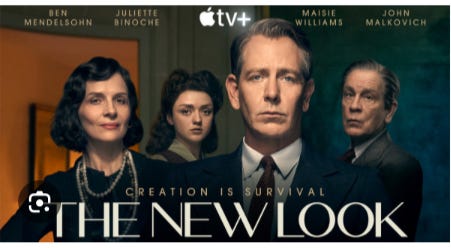
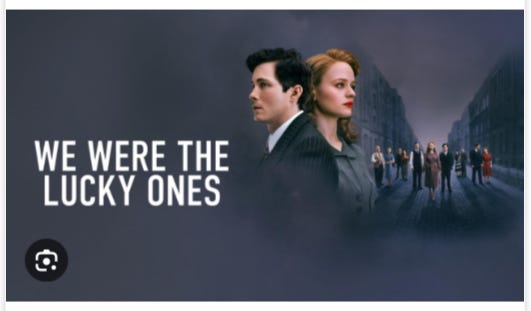
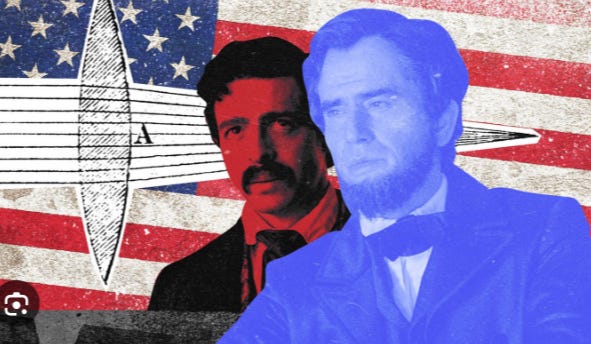
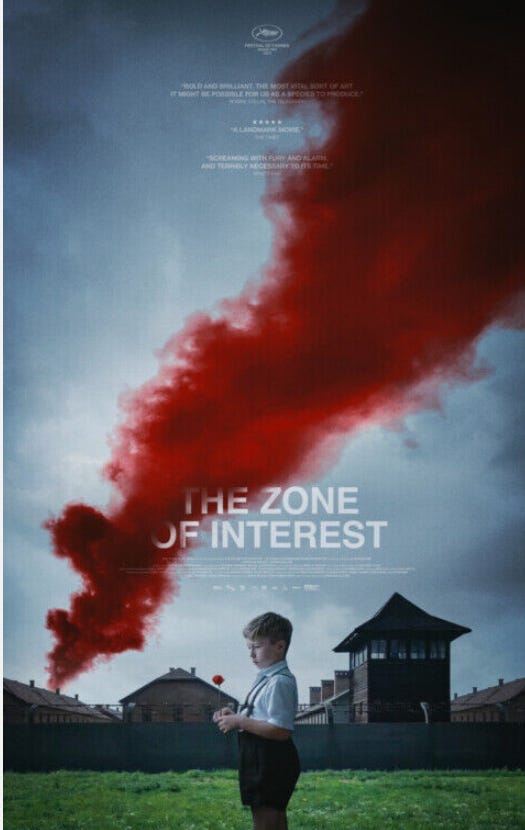
The New Look
Gripping story, beautiful production values. Even the opening credits are fabulosity. Ben Mendelsohn: phenomenal as Christian Dior. Talk about courage!! It’s not “brave” for a beautiful, fat and sag-free actress to get naked. It’s incredibly brave for a male actor to show this kind of emotion. Juliette Binoche: terrific as Coco Channel. John Malkovich and Emily Mortimer: Also wonderful!! (I’ve missed seeing Emily Mortimer, who I’ve loved since “Lovely and Amazing.”)
I never thought I’d get chills about an exhibit of couture dressed dolls!
And it’s a history lesson, too. A friend: “I had no idea the Nazis were in France.”
We Were the Lucky Ones
Not exactly my kind of series (too much forcing viewer what to feel.) But important!! Especially now. In a FB post I wrote: I rewatch “We Were the Lucky Ones” after two weeks of escalating anti-semitism and couldn’t help wondering: how many viewers would be able to feel any sympathy or horror over the experiences of those—and they were the lucky ones—who escaped Germany and Poland or after the war became refugees to Israel ?
The Kurc’s have “Jewish” accents. Most, if not all, the actors are Jews. One is Israeli. The family, before the Nazi occupation of Poland, had owned a thriving fabric business. They were wealthy, able initially to buy their way to (temporary) safety. I imagine how antisemites would cringe at the accents, I hear them saying vile things about the Hebrew prayers, muttering about the wealth of the Kurc family, snickering when the mother sews jewels into their clothes, or when the father bargains for an apartments with money. I keep thinking of that student protestor who, when asked “where do you expect Israelis to go if pushed out of Israel?” saying “They need to check their privilege.”
Manhunt
While I’m on the subject of history, this is an excellent one too. And with all kinds of resonances with “today.” Hammish Linklater is my favorite Lincoln so far (yes, including Daniel Day-Lewis.) He’s the first to de-mythologize and show his nervousness and fragility. Tobias Menzies: You can argue with me about it, but imo he’s one of the sexiest men on tv. It’s a history-based story that’s totally new to me, which I always love to find. And one of our Facebook pals—Jan Oxenberg—produced and co-wrote some of this fascinating (and gorgeous to look at) series!
The Zone of Interest
The film was many years in the making—so it’s impossible that Glazer had the Israel/Hamas war in mind when making it. That comparison was tacked on/exploited after the film was long-since completed. In my opinion the work stands on its own in the way I interpreted it: as about the kind of mentality that made and perpetuated the Holocaust.
That mentality—which can rightly be called “dehumanizing” (a word that shouldn’t be tossed around lightly) sees Jews not as human beings but as vermin to be exterminated as efficiently and thoroughly as possible. In one scene, Hoss and others calmly discuss the blueprints for a new kind of crematorium that will serve as a conveyer-belt for the mass incineration and disposal of Jewish bodies. In another, Hoss’s wife and servants pick through the clothing seized when the original owners arrived at the camps and were stripped.
The Nazi’s did not regard Jews as adversaries in a war, but pollutants. For them, killing Jews was no different from disinfecting a house of cockroaches. “The Zone of Interest,” the camera doesn’t take us into anyone’s mind; the main point of the movie is how oblivious they all are to the humanity of those inside the camp. But the viewer isn’t allowed to be. Throughout virtually the entire film, we hear and see what lies outside the walls of the Hoss’s house and garden: the screams, the gunshots, the arriving trains, the sound (and smoke) of the crematoriums. A piece of human bone is found in the stream in which the Höss family frolics. And we see their frantic efforts to disinfect themselves.
Sandra Huller is amazing as the Nazi wifey of “The Zone of Interest.” It’s an amazing shape-shift. The way she moves, hands on hips, stiffly divested of everything softly sexual about a woman’s body, officiously puttering about her luxurious home and garden, imperious with the servants, giggling over coffee with the other Nazi wives, she knows both her place—but also her value as a member (and reproducer) of the master race. I don’t know how Huller figured it out—maybe from old newsreels or movies—but even her posture seems exactly right.
Yentyl
This was a passion-project for Streisand, and one she worked tirelessly to get made despite objections—from her then boyfriend and partner Jon Peters, from studios reluctant to back “an ethnic period piece with transvestite undertones,” and from Isaac Bashevis Singer himself, who wrote the first screenplay, but then backed out, believing that “Streisand’s age and celebrity would detract from the film.”
Peters also argued that Barbra was too “feminine” to play the role. He changed his mind after Barbra disguised herself and scared him into thinking the house had been broken into by a man. Age was still an issue, so Yentl/Anshul’s age was changed from 16 to 26, and with Singer no longer a part of the project, the script went through numerous rewrites by others, including Elaine May, Jack Rosenthal, and Streisand herself. The script would go through 20 variations before production began.
There was also pressure to make it a musical. But the last thing Streisand wanted was a “Sound of Music” spectacle in which characters ostentatiously break into song. People don’t stop their lives to sing, she argued. And keeping the narrative of a young woman who disguises herself as a man in order to study Torah was her central goal. The songs should not be “musical numbers” but integrated seamlessly in that narrative, and for the most part, the film succeeds at that (except for a jarring ending sequence in which Yentl, on board a ship to the United States, breaks into song like Fanny Brice singing “Don’t Rain on My Parade.”)
My own favorite song in the movie is “No Wonder.” It’s not only because the song is lovely. It’s one thing to masquerade as a man; it’s another thing to begin to inhabit the experience of a man, and through that change of location, to appreciate the loveliness of a woman—and one so unlike oneself, whose life is precisely the one Yentl has rejected for herself. Streisand could have made Hadass (Amy Irving) into a caricature of everything it is assumed (incorrectly, as are many notions about feminists) that a feminist would detest: the woman who lives to please a man. But in Streisand’s view here, the problem is not Hadass. (Who wouldn’t fall in love with her?) It’s a social order in which the loveliness of a Hadass is reserved exclusively for men’s pleasure. Which is also a social order in which Yentl doesn’t fit.
Later on in the film, after they are married, Yentl and Hadass do fall in love with each other. And while Hadass believes she has fallen in love with Anshel—a man—Yentl knows very well that the person she has come to love is a woman. “Where is it written?”—a refrain of a song and a theme of the movie—doesn’t just apply to the rules against a woman becoming a scholar. It also applies to a woman loving another woman. Avigdor (Mandy Patinkin), too, is drawn to Anshel beyond friendship even though he believes Anshel to be a boy. It confuses him (“Why do you keep grabbing me?” Yentl/Anshul asks him) and he had known the truth, it would have horrified him. But it’s there: the heart goes where it goes, it doesn’t obey “what is written.”
Three great movies about the Jewish immigrant experience:
Hester Street (Director, Joan Micklin Silver; starring Carol Kane and Steven Keats.)
Crossing Delancey (Director, Joan Micklin Silver; starring Amy Irving and Peter Riegert)
Avalon (Director, Barry Levinson; starring Aidan Quinn, Armin Mueller-Stahl, Joan Plowright and Elizabeth Perkins.)
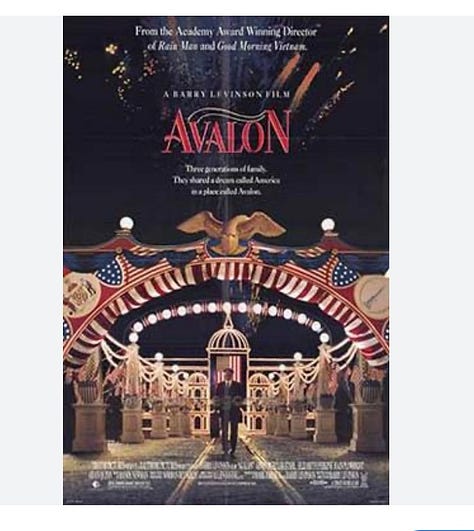
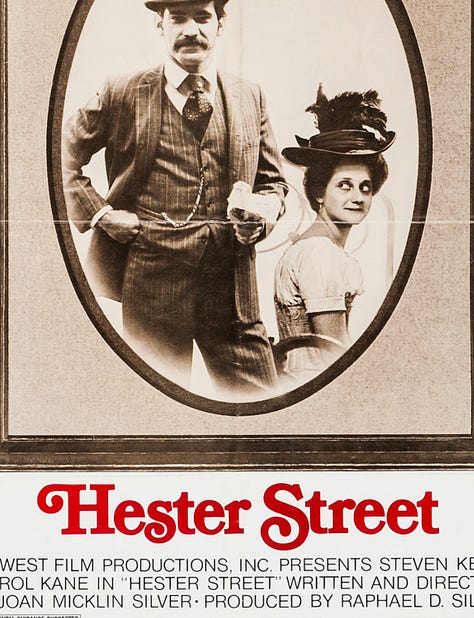
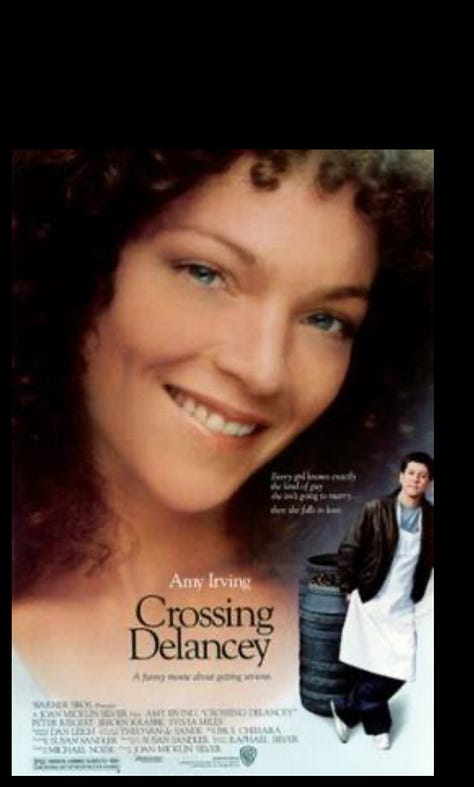
Two Great Documentaries:
If you thought just changing a doll’s skin color was all that it took to make Barbie “diverse,” you gotta watch “Black Barbie”!
Two hours long, and worth every moment. Originally aired on PBS, as part of the “American Masters” series, now on MAX.
Warning: If you are Jewish…or adore Bernstein’s music….or are a Mahler lover…or all three, you are probably going to be in tears at times.




















What a great list. We underestimate the value of a "binge-gift." Someone recommends a show we hadn't thought of watching or re-watching and thanks to them we have tens of hours of entertainment. That's a pretty amazing gift.
My wife and I are re-watching The Killing from a dozen or so years ago. It's much more entertaining to binge than to watch every week as it was originally shown.
I think it holds up great. I like everything about it, especially the relationship between the two lead detectives. We're watching the American version not the original one.
I have to tell you, I was annoyed by The Gilded Age. Not because the sets, or the dialogue. The entire production was scrumptious. But I simply could not abide the "rich" and "old NY." These people just seemed too...I don't know, they were just "too extra," as the kids say today.
Loved Manhunt, btw. A terrific part of history no one really every talks about and no one ever really talks about Stanton.
The New Look was scrumptious. But, I seriously had to do research about the Chanel brand after watching that. I couldn't abide that she was such a Nazi. I knew Chanel was a collaborator but had no idea it was so bad. I found out it is actually owned by a Jewish family and Largerfeld did alot to atone for CC's sordid history. So now I could go back to using my Chanel #5 and face creams that I love. That was a real relief. (seriously)
Happy Valley was my introduction to british streaming services. ACORN and BRITBOX are my go to. This was an exceptionally wonderful show. All 4 seasons.
Midnight in Paris is just fun. But you do have to have some idea who the people are that he meets...or it will be lost on you. (if you are going to worry about the personal lives of everyone in a movie, you will never watch anything ever again)
I usually like Bridgerton, but this time I skipped some episodes. I don't know. It's not that it is wearing thin. There is just that undercurrent of mean I can't hack at the moment.
Age of Innocence..well it doesn't really get any better than that movie.
Thank you for this wonderful list and being so generous with listening to my chatter.